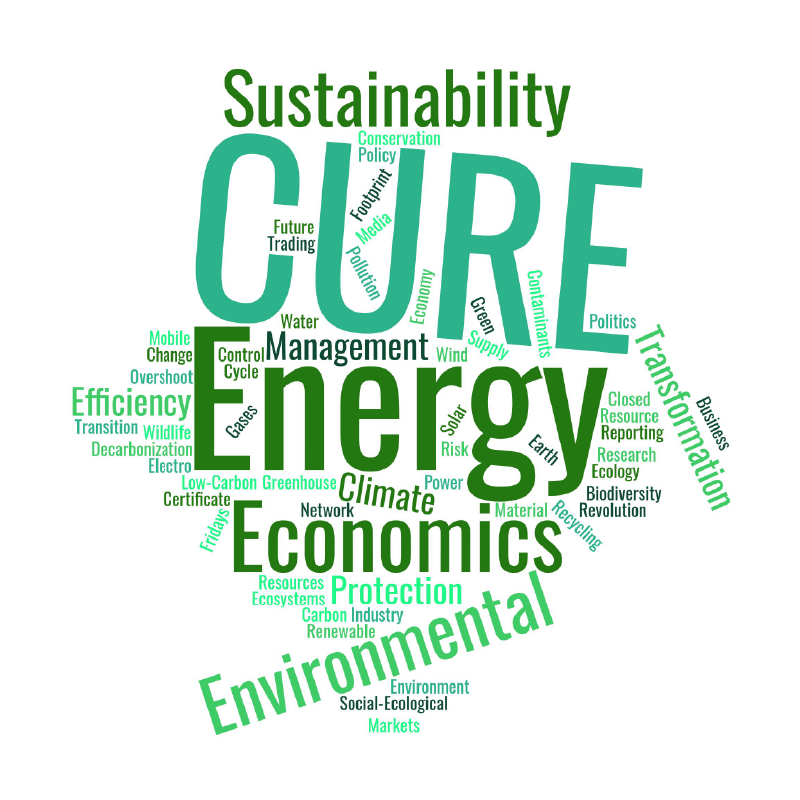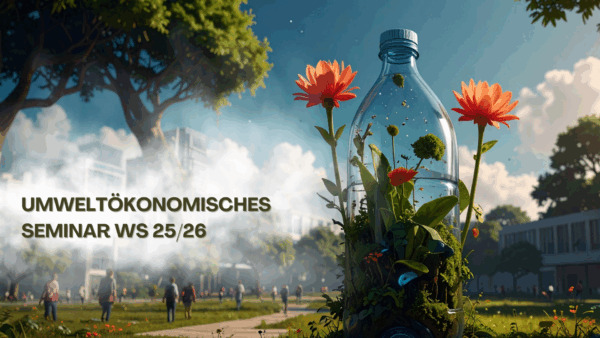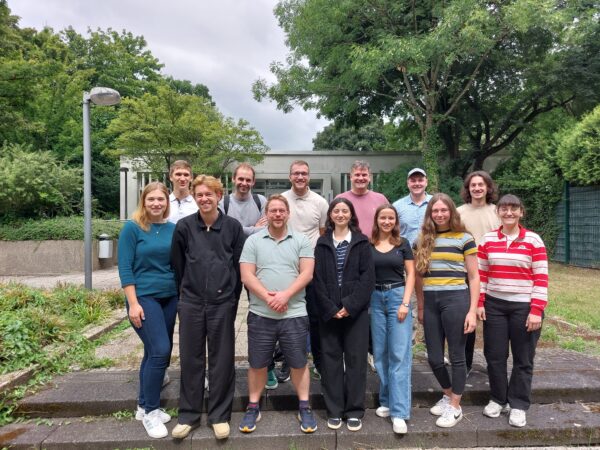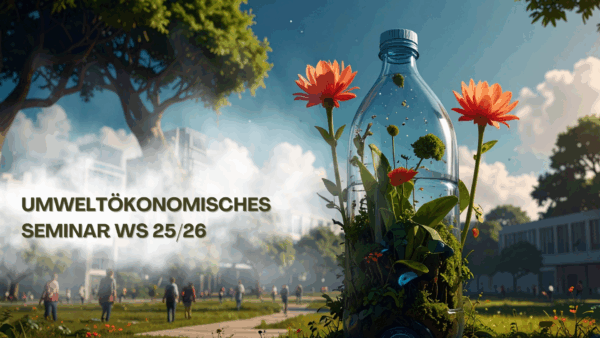Welcome to CURE
Center for Environmental Management, Resources and Energy
ABOUT US
Climate change, the energy transition, declining biodiversity and sustaina-bility are the challenges of modern time. These are also the topics that form the core of research and teaching at the Center for Environmental Management, Resource and Energy Economics.
CURE has been established within the Faculty of Management and Economics at the Ruhr-Universität Bochum to enhance the joint research activities of the scholars focusing on the following topics:
- Energy and climate economics
- Operational and economic sustainability
- Economics in competition-based economic systems
- Corporate environmental management
- Decarbonization of operational production and service processes
- Protection of species and resources (animals, plants, water, soil, air)
The aim of the center is, on the one hand, to bundle and coordinate the relevant teaching within the bachelor and master modules. On the other the center enhances an integrative approach, which incorporates business administration, economics and legal perspectives. The aim is to set up a group of young researchers at CURE that advances the inter- and transdisciplinary social-ecological research in conjunction with other faculties at the Ruhr-Universität Bochum.

Team
Our Focus Topics
We bring together those who focus on the following topics in teaching and research:
01
Energy and climate economics
02
Operational and economic sustainability economics in competition-based economic systems
03
Corporate environmental management
04
Decarbonization of operational production and service processes
05
Protection of species and resources (animals, plants, water, soil, air)
06
Participation & transformation
Research
Research Projects
Research Groups
Publications
Jan-Hendrik Kamlage & Julia Uhlig (2024). Paradoxien des Synodalen Wegs: Wie geht Beteiligung in den hierarchischen Stukturen der katholischen Kirche?: eine sozialwissenschaftliche Perspektive. ISBN: 978-3-451-02337-8.
Dr. Maik Bohne, Jana Wegener, Julia Uhlig, Falk Beinker, Maja Kiba-Janiak, Małgorzata Krzywonos, Agnieszka Jagoda, Tomasz Kołakowski, Jakub Marcinkowski, Marek Wąsowicz, Jarosław Witkowski, Joanna Łyszkiewicz-Potaczek, Emil Lezak, Jakub Pluta, Blanka Romanowska, Damian Kołakowski, Kamila Okoń, Agnieszka Skoczylas, Patryk Białas, Agnieszka Zięcia, Anna Gorczyca, Stanisław Grygierczyk, David Lemiski, Walther Ploos van Amstel (2023). The state-of-the-art of stakeholders in waste and recycling in regions. D1.2. Circular Foam.
Jana Wegener, Julia Uhlig, Dr. Maik Bohne, Falk Beinker, Maja Kiba-Janiak, Agnieszka Jagoda, Małgorzata Krzywonos, Tomasz Kołakowski, Jakub Marcinkowski, Marek Wąsowicz, Bartłomiej Jefmański, Jarosław Witkowski, Emil Lezak, Jakub Pluta, Blanka Romanowska, Damian Kołakowski, Kamila Okoń, Agnieszka Skoczylas, Patryk Białas, Agnieszka Zięcia, Anna Gorczyca, Stanisław Grygierczyk, David Lemiski, Walther Ploos van Amstel (2023). Stakeholder map and regional readiness for a systemic territorial solution. D1.1. Circular Foam.
Diana D. Boermans, Agnieszka Jagoda, David Lemiski, Jana Wegener, Malgorzata Krzywonos (2024).
Environmental awareness and sustainable behavior of respondents in Germany, the Netherlands and Poland: A qualitative focus group study. In: Journal of Environmental Management, Volume 370, 2024, 122515, ISSN 0301-4797, https://doi.org/10.1016/j.jenvman.2024.122515.
Gatto, A., Sadik-Zada, E.R. REDD+. In Indonesia: An assessment of the international environmental program. Environment, Development and Sustainability (2024). https://doi.org/10.1007/s10668-024-05368-w
Roos, M. (2024). Principles of Complexity Economics. Classroom Companion: Economics. Springer Cham. https://doi.org/10.1007/978-3-031-51436-4
Network
IBE
Professors of CURE
Ausführliches Profil von Prof. Bertsch auf den Seiten des Lehrstuhls Energiesysteme und Energiewirtschaft der RUB
He studied business administration and law at the University of Mannheim and the University of California at Berkeley. He was awarded a doctorate in law and a PhD in 1998 and subsequently studied administrative sciences at the German University of Administrative Sciences in Speyer. Sven-Joachim Otto is a Partner at EY, where he leads the Mid Market practice in the Government & Public Sector as well as Infrastructure (Germany, Switzerland, Austria). He focuses on the developments in the various energy markets, especially against the backdrop of the currently advancing transformations at the interfaces to the mobility/transportation (traffic turnaround), real estate (heat turnaround) and industry sectors. Digitization is seen in the broadest sense as an enabler for the necessary transformation processes toward resource-efficient, sustainable and competitive business models.
Translated with www.DeepL.com/Translator (free version)
Prof. Dr. Dr. h.c. Christoph M. Schmidt, born in 1962, has been President of RWI – Leibniz Institute for Economic Research in Essen since 2002 and also holds the Chair for Economic Policy and Applied Econometrics at the Faculty of Management and Economics at the Ruhr-Universität Bochum. He studied economics at the University of Mannheim, received his PhD from Princeton University in 1991, completed his habilitation at the University of Munich in 1995, and held the Chair of Econometrics at the University of Heidelberg from 1996 to 2002.
He was a member of the German Council of Economic Experts from 2009 to 2020 and its chairman from 2013 to 2020. Since 2019 he has been a member, and since 2020 co-chairman, of the Franco-German Council of Economic Experts. From 2011 to 2013, he was a member of the Enquete Commission “Growth, Prosperity, Quality of Life” of the German Bundestag. From 2019 to 2022, he was a member, and since 2020 co-chairman, of the Franco-German Council of Economic Experts. From 2020 to 2021 he was a member of the “Corona-Expertenrat” (Corona Council of Experts) of the Minister President of North Rhine-Westphalia. He has been a member of acatech – Deutsche Akademie der Technikwissenschaften since 2011, a member of the presidium since 2014, and vice president since 2020. He is a member of the National Academy of Sciences Leopoldina (since 2020), the Mainz Academy of Sciences and Literature (since 2015) and the North Rhine-Westphalian Academy of Sciences and Arts (since 2018).
He has been Chairman of the Board of Trustees of the Max Planck Institute for Tax Law and Public Finance in Munich since 2013, a member of the Board of Trustees of the Alfried Krupp von Bohlen und Halbach Foundation since 2014 and deputy chairman since 2020, a member of the Scientific Advisory Board of the Fritz Thyssen Foundation since 2016, Chairman of the Scientific Advisory Board of the Energy Economics Institute at the University of Cologne (EWI) since 2020, and since 2020, member of the expert panel of the programme for the promotion of top-level research at universities (“Exzellenzstrategie”) of the Joint Science Conference (GWK) and since 2021 member of the Supervisory Board of BMW AG.
His work focuses on applied econometrics, including energy, health, and labor economics, as well as on the interface between research and science-based policy advice. He was editor of the Journal of Population Economics (1996 to 2002) and the German Economic Review (2009 to 2013). In 2016, he received the Gustav Stolper Award of the Verein für Socialpolitik, and in 2019, he received an honorary doctorate from the Faculty of Economics at Leibniz Universität Hannover. In 2019, he was also awarded the title “Bürger des Ruhrgebiets” (citizen of the Ruhr area) by the association pro Ruhrgebiet. The state of North Rhine-Westphalia has awarded the 2022 Innovation Prize in the “Honorary Award” category to Christoph M. Schmidt.
Applied Economic Policy
Marion Steven completed a banking apprenticeship in 1981. She then studied, obtained her doctorate and habilitated at the University of Bielefeld. She received her doctorate in Hierarchical Production Planning and her habilitation in Production and Environmental Protection. Based on the fact that a large part of environmental pollution results from industrial manufacturing processes, Marion Steven has been dealing with the environmental impacts of production in research and teaching for a long time. Previous research topics have included the integration of the environmental factor into various production theory concepts, waste disposal logistics, environmental cost accounting, circular economy, the impact of the EU-ETS on the aviation industry, and environmental reporting. Currently, the research focus is on the development of sustainability indicators (Green Productivity Index), which allow an integrated assessment of the economic, environmental and social aspects of production, and the investigation of the impact of digitalization on sustainability both at the level of the individual company and in Industry 4.0 networks. Furthermore, the sustainability potentials of Smart-Circular Product-Service-Systems are investigated, where the circular economy is combined with the sharing economy to achieve a more intensive and longer use of materials available in the economic system.
Er studierte physikalische Wissenschaften (Bachelor of Applied Science) an der University of Oxford und Systemtechnik (Masters degree) an der City University London. Anschließend absolvierte er seinen MBA an der Cranfield University. Die Forschung und Lehre von Graham Weale konzentriert sich auf wirtschaftliche und politische Fragen im europäischen Energiesektor, auf die Märkte für Strom- und Kohlenstoffemissionen und darauf, wie Emissionsminderungen in verschiedenen Mitgliedstaaten erreicht werden.
Lecture Course – Winter Semester
- Advanced Energy Economics Policy and Technology
- Aims: to understand how economics, policy drivers and technology developments determine the demand for energy, the energy mix, the prices and emissions.
- M.Sc Lecture Course – Advanced Energy Economics Policy and Technology – Prof. Graham Weale
Seminar Course – Summer Semester
- Advanced Energy Economics Policy and Technology
- Aims: to analyse in detail an important current issue in energy.
- M.Sc Seminar Projects – Advanced Energy Economics Policy and Technology – Prof. Graham Weale
Präsentationen:
- The role of carbon prices vs. other drivers for industry decarbonisation – case studies from Germany
- Molekülwende goes global – warum wir eine importorientierte Wasserstoffstrategie brauchen
- Challenges in design and negotiation of hydrogen supply contracts – lessons from natural gas
Publikationen:
Veranstaltungen:
Centrum für Umweltmanagement, Ressourcen und Energie (CURE)
Ruhr-Universität Bochum
Universitätsstraße 150
44801 Bochum
Phone: 0234 32-21282
E-Mail: cure-econ@rub.de
Further thematic fields of competences
SMD
Sales Management Department
FAACT
Finance, Accounting, Auditing, Controlling, Taxation
CEIT
CISE
Centre for International and Spatial Economics









